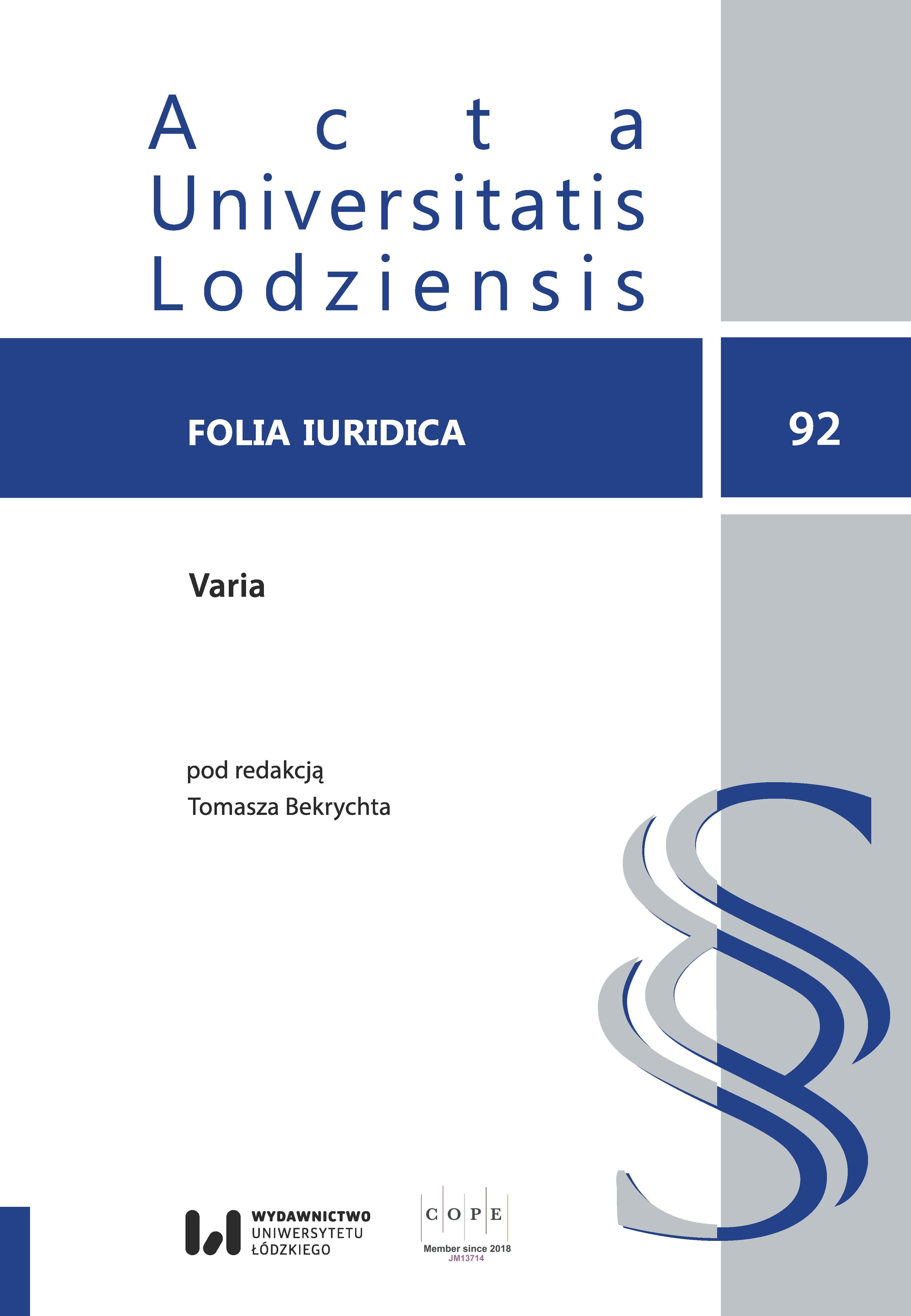Problematyka projektowania ustaw – kilka uwag z perspektywy filozoficznej
DOI:
https://doi.org/10.18778/0208-6069.92.04Słowa kluczowe:
ustawodawstwo, nowy konstytucjonalizm, narracje, biurokracja, projektowanie ustawAbstrakt
Artykuł bada związki pomiędzy procesem stanowienia prawa a narracjami. Niewątpliwie, proces tworzenia ustaw jest kwestią konstytucyjną, ale Konstytucja porządkuje jedynie fragment tego procesu. Konstytucja, czy też inne ustawy, nie regulują części procesu legislacyjnego wdrażanego przez rząd (głównie w fazie wstępnej), jakkolwiek jest on ważny i wpływa na pozostałe jego etapy. Działanie rządu jawi się tu jako sfera nieformalnych regulacji ukrytych przed kontrolą społeczeństwa. W artykule bada się znaczenie biurokratycznych elementów procesu stanowienia prawa, kładąc nacisk na podejście narracyjne: to narracje uzasadniają prawodawstwo. Powstaje pytanie, jak możemy przezwyciężyć dualizm narracyjny – jeden determinowany interesami globalnej wspólnoty, drugi interesami poszczególnych państw?
Pobrania
Bibliografia
Althusser, Louis. 2014. On the Reproduction of Capitalism: Ideology and Ideological State Apparatuses. New York: Verso.
Google Scholar
Bacon, Francis. 1785. Reading upon the Statute of Uses. London: E. Brooke, Bell Yard, Temple Bar.
Google Scholar
Baudrillard, Jean. 1994. Simulacra and Simulation. Ann Arbor: University of Michigan Press.
Google Scholar
DOI: https://doi.org/10.3998/mpub.9904
Bauman, Zygmunt. 1989. Modernity and Holocaust. Cambridge: Polity Press.
Google Scholar
Benedict XVI. 2009. Caritas in veritate. http://w2.vatican.va/content/benedict-xvi/en/encyclicals/documents/hf_ben-xvi_enc_20090629_caritas-in-veritate.html [accessed: February 29, 2020].
Google Scholar
Benjamin, Walther. 1988. Illuminations. New York: Random House.
Google Scholar
Bentham, Jeremy. 1843. The Works of Jeremy Bentham. Vol. 3. Edinburgh: William Tait.
Google Scholar
Bielska-Brodziak, Agnieszka. 2017. Śladami prawodawcy faktycznego: materiały legislacyjne jako narzędzie wykładni prawa. Warszawa: Wolters Kluwer.
Google Scholar
Borowicz, Adam. 2009. “Argument interpretacyjny odwołujący się do woli rzeczywistego prawodawcy”. Studia Prawno-Ekonomiczne 79: 9–28.
Google Scholar
Bourdieu, Pierre. 1987. “The Force of Law: Toward a Sociology of Juridical Field”. The Hastings Law Journal 38(5): 814–853.
Google Scholar
Bourdieu, Pierre. 1991. Language and Symbolic Power. 7th printing. Cambridge: Harvard University Press.
Google Scholar
Bourdieu, Pierre. 1996. The Rules of Art: Genesis and Structure of the Literary Field. Stanford: Stanford University Press.
Google Scholar
DOI: https://doi.org/10.1515/9781503615861
Bourdieu, Pierre. 1999. Outline of a Theory of Practice. 14th printing. Cambridge: Cambridge University Press.
Google Scholar
Bourdieu, Pierre. 2001. Masculine Domination. Stanford: Stanford University Press.
Google Scholar
Bourdieu, Pierre. Randal Johnson, 1993. The Field of Cultural Production: Essays on Art and Literature. New York: Columbia University Press.
Google Scholar
Brooks, Peter. 2002. “Narrativity of the Law”. Law and Literature 14(1): 1–10.
Google Scholar
DOI: https://doi.org/10.1525/lal.2002.14.1.1
Calabresi, Guido. 1982. Common Law for the Age of Statutes. Cambridge: Harvard University Press.
Google Scholar
Cohen, Stanley. 2011. Folk Devils and Moral Panics: the Creation of the Mods and Rockers. New York: Routledge.
Google Scholar
DOI: https://doi.org/10.4324/9780203828250
Cover, Robert M. 1983. “Foreword: Nomos and Narrative”. Harvard Law Review 97(1): 4–68.
Google Scholar
DOI: https://doi.org/10.2307/1340787
Cover, Robert M. 1985. “Folktales of Justice: Tales of Jurisdiction”. Capital University Law Review 14(2): 179–204.
Google Scholar
Dawkins, Richard. 1998. “Postmodernism Disrobed”. Nature 394(6689): 141–143.
Google Scholar
DOI: https://doi.org/10.1038/28089
Eco, Umberto. 1981. The Role of the Reader: Explorations in the Semiotics of Texts. Bloomington: Indiana University Press.
Google Scholar
Foucault, Michel. 1979. Discipline and Punish: the Birth of the Prison. New York: Vintage Books.
Google Scholar
Geertz, Clifford, 1973. The Interpretation of Cultures: Selected Essays. New York: Basic Books.
Google Scholar
Krygier, Martin. 1988. “The Traditionality of Statutes”. Ratio Juris 20(1): 20–39.
Google Scholar
DOI: https://doi.org/10.1111/j.1467-9337.1988.tb00002.x
Lukács, Georg. 1971. History and Class Consciousness: Studies in Marxist Dialectics. 6th printing. Cambridge: MIT Press.
Google Scholar
Lyotard, Jean-François. 1984. The Postmodern Condition: a Report on Knowledge. Minneapolis: University of Minnesota Press.
Google Scholar
DOI: https://doi.org/10.2307/1772278
Mannheim, Karl. 1966. Ideology and Utopia: an Introduction to the Sociology of Knowledge. Reprinted. London: Routledge & Kegan Paul.
Google Scholar
Mańko, Rafał. 2018. W stronę krytycznej filozofii orzekania. Polityczność, etyka, legitymizacja. Łódź: Wydawnictwo Uniwersytetu Łódzkiego.
Google Scholar
McKinley, Bob. 2000. “Postmodernism Certainly Is Not Science, but Could It Be Religion?” CSAS Bulletin 36(1): 16–18.
Google Scholar
DOI: https://doi.org/10.1525/csas.2000.36.1.16
Montesquieu, Michel de. 1777. The Complete Works of M. de Montesquieu in Four Volumes. Volume the Second. The Spirit of Laws. Dublin: W. Watson et al.
Google Scholar
Paulus, Ingeborg. 1974. The Search for Pure Food: a Sociology of Legislation in Britain. London: M. Robertson.
Google Scholar
Robinson, Chester A. 1991. The Bureaucracy and the Legislative Process: a Case Study of the Health Care Financing Administration. University Press of America.
Google Scholar
Savigny, Friedrich Karl von. 1999. Of The Vocation of our Age for Legislation and Jurisprudence. Kitchener: Batoche.
Google Scholar
Smejkalová, Terezie. Martin Škop. 2017. “A Concept of a Reader in Legislation Drafting”. In Argumentation 2017. 51–69. Edited by Markéta Štěpáníková et al. Brno: Masaryk University.
Google Scholar
Streeck, Wolfgang. 2017. “Caution: European Narrative. Handle with Care!” In European Union and Disunion: Reflections on European Identity. 14–22. Edited by Ash Amin, Philip Lewis. London: The British Academy.
Google Scholar
Sullivan, Ruth. 2007. Statutory Interpretation. 2nd edition. Ottawa: Irwin Law.
Google Scholar
Škop, Martin. Barbora Vacková. 2019. “Být legislativcem: Empirická šetření v administrativních fázích legislativy”. Časopis pro právní vědu a praxi 27(1): 5–28.
Google Scholar
DOI: https://doi.org/10.5817/CPVP2019-1-1
Škop, Martin. Monika Hanych. Michal Malaník. Terezie Smejkalová. Markéta Štěpáníková. Barbora Vacková. 2019. Tvorba práva – Empirické studie. Brno: Masarykova Univerzita.
Google Scholar
Tait, Allison. Luke Norris. 2011. “Narrative and the Origins of Law”. Law and Humanities 5(1): 11–22.
Google Scholar
DOI: https://doi.org/10.5235/175214811796219745
Wronkowska, Sławomira. 1987. “The Rational Legislator as a Model of Real Lawmaker”. In Polish Contributions to the Theory and Philosophy of Law. 179–188. Edited by Zygmunt Ziembiński. Amsterdam: Rodopi.
Google Scholar
Pobrania
Opublikowane
Jak cytować
Numer
Dział
Licencja

Utwór dostępny jest na licencji Creative Commons Uznanie autorstwa – Użycie niekomercyjne – Bez utworów zależnych 4.0 Międzynarodowe.














